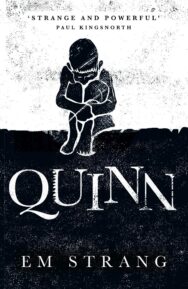‘We slow down, become more attentive. We are not following clues so much as Quinn’s memories, dreams and stories.’
In Quinn, the debut novel by Em Strang, David Robinson finds a subtle and sophisticated exploration of forgiveness and motive.
Quinn
By Em Strang
Published by Oneworld
Cast your mind back a month, to Tommy Lee Royce taking his revenge cold in the final series of the BBC TV drama Happy Valley. A psychopath, yes, but at least you felt you knew the way his mind worked, what he had done in the past and what intended to do in the future. Circling round Tommy Lee was a plot whose intricacy only our heroine, Sgt Catherine Cawood, could fathom. But she did, and we followed her for all the deep-down reasons people watch crime drama: not just the solving of the puzzle but the reassurance of justice being seen to be done and order restored. The same things apply with crime novels: see it, read it, sorted.
I read Quinn, Em Strang’s short but intense debut novel, just after binge-watching Sally Wainwright’s TV series. Both deal with murder and the possibilities – or otherwise – of forgiveness. But there the comparisons end and the differences between crime and literary fiction start to open up.
Take uncertainty. While we know everything about the crimes Tommy Lee Royce has committed, we know hardly anything about what Strang’s eponymous hero has done. Indeed, we’re not even sure that he has indeed killed anyone, though clearly he is in detention of some sort after the death of Andrea, his best friend since childhood and subsequent lover. We don’t know too much about Quinn’s life, how old he was when he and Andrea fell in love, whether or not they had a fatal falling out, and if they did what caused it. All the who, what, where, when, how of the crime has, at least in Quinn’s own mind, disappeared.
What’s there instead? Well, there’s guilt, even though it’s unspecified: something that weighs on him, even though he sometimes tries to convince himself that one day Andrea will turn up and everyone will have to tell him they’re sorry. Sorry for locking him up in that cell where the only other occupant is Stone Man who usually sits crouched in a recess in the wall but occasionally emerges from it to take photos of him. Sorry for uniformed staff beating him up for no reason, sorry even for the maggots eating their way in his dreams through his rotting cheeks no matter how many times he brushes them off and hears them ‘fall plip plip plip on the concrete floor’.
All of which, for a prisoner whose mind has only a meniscus of rationality, has the ring of truth. Suppose you were such a man and had killed the woman you loved. For your own sanity’s sake there would indeed be memories that you would want to bury deep and leave unexpressed. Instead, you might prefer to dwell on other things less freighted with pain: the silver birch tree in the forest that you and Andrea had marked out as your own, the miniature plastic doll she gave you because she thought it looked a bit like her. You’d think about such things and, because imprisonment means you’re suspended in time, those thoughts might run in a loop ‘like a wheel without spokes’. There’d be bags of self-pity in the mix too, and if your childhood was laced with oppressive parents and religion, those thoughts might also have the quasi-Biblical form of expression they do here, right from the occasionally repeated opening sentence: ‘Things have been done that hurt the mouth to speak of.’
Already, you can see, we have moved far away from Tommy Lee Royce, but Strang’s short, intense novel takes us even further. Quinn is, or yearns to be, a writer. He wants to impress Andrea with his stories. ‘I wanted to say something new and present readers with a challenge, but if I wanted publication, I had to turn out a series of stock images and ideas that people could take comfort from or use to explain the world away’.
This, you can’t help thinking, might well apply to Strang too. An award-winning poet who has worked in Scottish prisons for a decade, she is presumably well versed in how far apart the cliches of crime fiction are from the inner lives of prisoners she has come to know. ‘People like certainty and clarity,’ notes Quinn, ‘especially when they are afraid’ – which is why, after Andrea’s death, suspicion at first fell on a stranger who’d been in touch with her. ‘No-one knew anything about him, so it was easy to attach blame, to indict and demonise. Where there is no understanding, there is harsh judgment.’
So how does Strang do the opposite of this for Quinn, a man who is so clearly an unreliable narrator? The first, and most obvious, way is through Jennifer, Andrea’s mother, who arouses the anger of her neighbours by inviting Quinn to share her home after he is released from prison. If she can see some good in him, surely there must be? But the forgiven, redeemed prisoner is yet another of those predictable story arcs that Quinn himself would scorn to write – just, in fact, like the one about the prisoner who is only cynically faking a wish to be forgiven. Strang knows this, and clearly realises that her readers are watching out for the first sign of any dash towards the predictable. Her talent lies in the way that she keeps them inside Quinn’s fraying, frightened mind, smuggling him past condemnation even when he is caught lying to himself.
How does she do it? Technically, by nudging us away from linear narrative, avoiding any official account of Andrea’s death, and relying entirely on what is going on inside Quinn’s head – even if that is as far removed from the crime for which he has been imprisoned as a memory of being made to kill a chicken as a seven-year-old. The way in which the story appears on the page further underlines this, as each paragraph is preceded by a complete line break, which is astonishingly effective in making us read in a different way altogether. We slow down, become more attentive. We are not following clues so much as Quinn’s memories, dreams and stories. These might or might not – I’m not going to tell you – reveal what really happened to Andrea, and whether or not Quinn ends up being truly forgiven. But in a way which is imaginative, compelling and refreshingly cliche-free, they explain everything you need to know about him.
Quinn by Em Strang is published by Oneworld, priced £14.99.
ALSO IN THIS ISSUE

 Why We’re Publishing The Zekameron
Why We’re Publishing The Zekameron
‘As for the book itself, it important to emphasise that it is not memoir, not fact, it is fiction – …

 The Hidden Fires: Merryn Glover on Nan Shepherd
The Hidden Fires: Merryn Glover on Nan Shepherd
‘As I follow her in recounting the ‘grace accorded from the mountain’, I sense her blessing.’













